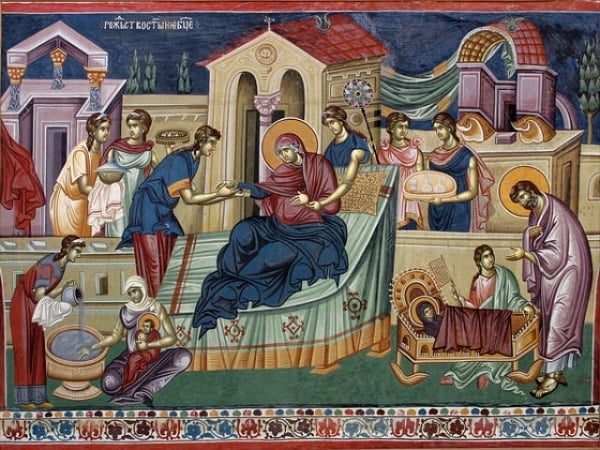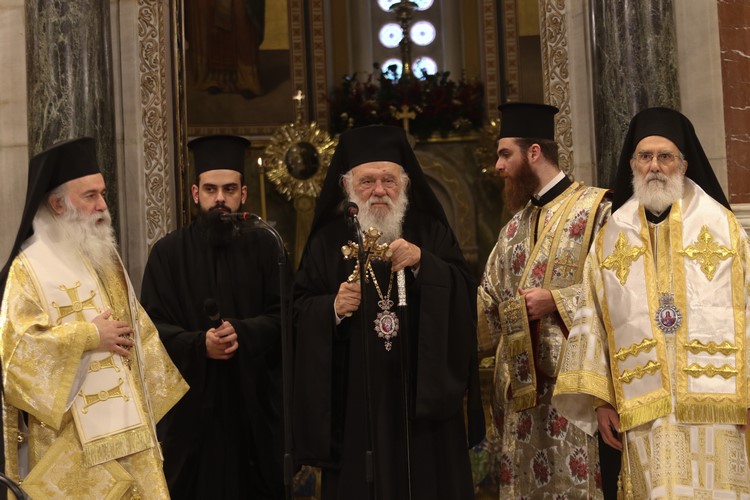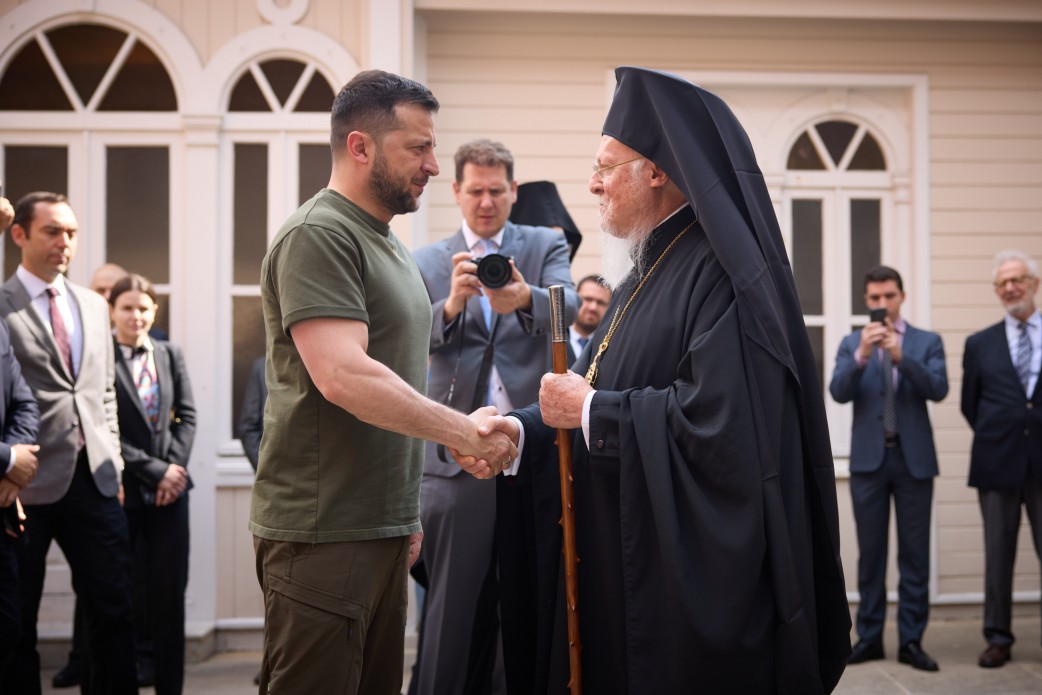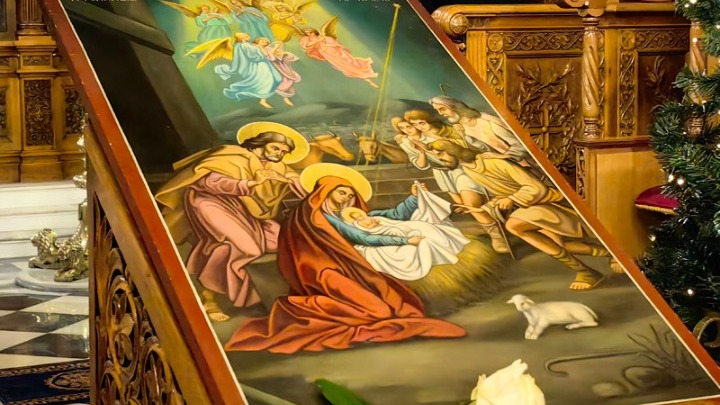The Nativity of our Most Holy Lady Theotokos and Ever-Virgin Mary (8 September)


The Nativity of Our Most Holy Lady Theotokos and Ever Virgin Mary: The Most Holy Virgin Mary was born at a time when people had reached such a degree of moral decay that it seemed altogether impossible to restore them. People often said that God must come into the world to restore faith and not permit the ruin of mankind.
The Son of God chose to take on human nature for the salvation of mankind, and chose as His Mother the All-Pure Virgin Mary, who alone was worthy to give birth to the Source of purity and holiness.
The Nativity of Our Most Holy Lady Theotokos and Ever Virgin Mary is celebrated by the Church as a day of universal joy. Within the context of the Old and the New Testaments, the Most Blessed Virgin Mary was born on this radiant day, having been chosen before the ages by Divine Providence to bring about the Mystery of the Incarnation of the Word of God. She is revealed as the Mother of the Savior of the World, Our Lord Jesus Christ.
The Most Holy Virgin Mary was born in the small city of Galilee, Nazareth. Her parents were Righteous Joachim of the tribe of the Prophet-King David, and Anna from the tribe of the First Priest Aaron. The couple was without child, since Saint Anna was barren.
Having reached old age, Joachim and Anna did not lose hope in God’s mercy. They had strong faith that for God everything is possible, and that He would be able to overcome the barrenness of Anna even in her old age, as He had once overcame the barrenness of Sarah, spouse of the Patriarch Abraham. Saints Joachim and Anna vowed to dedicate the child which the Lord might give them, to the service of God in the Temple.
Childlessness was considered among the Hebrew nation as a Divine punishment for sin, and therefore the righteous Saints Joachim and Anna had to endure abuse from their own countrymen. On one of the feastdays at the Temple in Jerusalem the elderly Joachim brought his sacrifice to offer to God, but the High Priest would not accept it, considering him to be unworthy since he was childless.
Saint Joachim in deep grief went into the wilderness, and there he prayed with tears to the Lord for a child. Saint Anna wept bitterly when she learned what had happened at the Jerusalem Temple. Never once did she complain against the Lord, but rather she prayed to ask God’s mercy on her family.
The Lord fulfilled her petitions when the pious couple had attained to extreme old age and prepared themselves by virtuous life for a sublime calling: to be the parents of the Most Holy Virgin Mary, the future Mother of the Lord Jesus Christ.
The Archangel Gabriel brought Joachim and Anna the joyous message that their prayers were heard by God, and of them would be born a most blessed daughter Mary, through Whom would come the Salvation of all the World.
The Most Holy Virgin Mary surpassed in purity and virtue not only all mankind, but also the angels. She was manifest as the living Temple of God, so the Church sings in its festal hymns: “the East Gate… bringing Christ into the world for the salvation of our souls” (2nd Stikhera on “Lord, I Have Cried”, Tone 6).
The Nativity of the Theotokos marks the change of the times when the great and comforting promises of God for the salvation of the human race from slavery to the devil are about to be fulfilled. This event has brought to earth the grace of the Kingdom of God, a Kingdom of Truth, piety, virtue and everlasting life. The Theotokos is revealed to all of us by grace as a merciful Intercessor and Mother, to Whom we have recourse with filial devotion.
According to the ancient tradition of the Church, the Theotokos was born of barren and aged parents, Joachim and Anna, about the year 16 or 17 before the birth of Christ. Joachim was descended from the royal line of David, of the tribe of Judah. Anna was of the priestly tribe of Levi, a daughter of the priest Matthan and Mary, his wife.
The Holy Virgin Mary was born of aged parents, Joachim and Anna. Her father was of the lineage of David, and her mother of the lineage of Aaron. Thus, she was of royal birth by her father, and of priestly birth by her mother. In this, she foreshadowed Him Who would be born of her as King and High Priest. Her parents were quite old and had no children. Because of this they were ashamed before men and humble before God. In their humility they prayed to God with tears, to bring them joy in their old age by giving them a child, as He had once given joy to the aged Abraham and his wife Sarah by giving them Isaac.
The Almighty and All-seeing God rewarded them with a joy that surpassed all their expectations and all their most beautiful dreams. For He gave them not just a daughter, but the Mother of God. He illumined them not only with temporal joy, but with eternal joy as well. God gave them just one daughter, and she would later give them just one grandson–but what a daughter and what a Grandson! Mary, Full of grace, Blessed among women, the Temple of the Holy Spirit, the Altar of the Living God, the Table of the Heavenly Bread, the Ark of God’s Holiness, the Tree of the Sweetest Fruit, the Glory of the race of man, the Praise of womanhood, the Fount of virginity and purity–this was the daughter given by God to Joachim and Anna.
She was born in Nazareth, and at the age of three, was taken to the Temple in Jerusalem. In her young womanhood she returned again to Nazareth, and shortly thereafter heard the Annunciation of the Holy Archangel Gabriel concerning the birth of the Son of God, the Savior of the world, from her most-pure virgin body.
Apolytikion of Nativity of the Theotokos
Fourth Tone
Your birth, O Theotokos, brought joy to the whole world, for from you dawned the sun of righteousness, Christ our God. Freeing us from the curse, He gave us His blessings. Abolishing death, He granted us eternal life.
Kontakion of Nativity of the Theotokos
Fourth Tone
In your holy birth, Immaculate One, Joachim and Anna were rid of the shame of childlessness; Adam and Eve of the corruption of death. And so your people, free of the guilt of their sins, celebrate crying: “The barren one gives birth to the Theotokos, who nourishes our life.”
Source: oca.org / goarch.org / westserbdio.org




